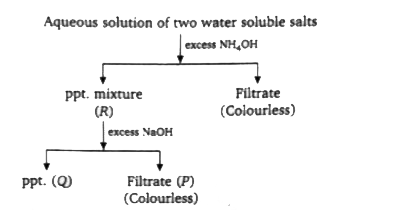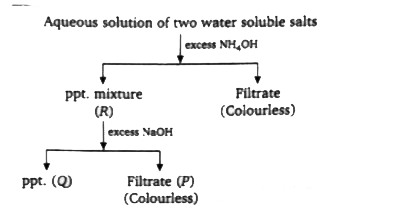
Q. When H2S gas was passed into filtrate (P), a coloured precipitate was obtained, then cation present in the filtrate is:
A
Zn2+(aq.)
B
Cr3+(aq.)
C
Al3+(aq.)
D
Pb2+(aq.)
Text Solution
The correct Answer is:D
PbS (Black ppt).
|
Topper's Solved these Questions
- TYPES OF REACTIONSBOOK - VK JAISWALCHAPTER - TYPES OF REACTIONSEXERCISE - ONE OR MORE ANSWERS IS/ARE CORRECT
40 Videos
- TYPES OF REACTIONSBOOK - VK JAISWALCHAPTER - TYPES OF REACTIONSEXERCISE - MATCH THE COLUMN
18 Videos
- TYPES OF REACTIONSBOOK - VK JAISWALCHAPTER - TYPES OF REACTIONSEXERCISE - LEVEL 2
196 Videos
- s-BLOCK ELEMENTSBOOK - VK JAISWALCHAPTER - s-BLOCK ELEMENTSEXERCISE - SUBJECTIVE PROBLEMS
2 Videos
Similar Questions
Knowledge Check
A red colouration or precipitate is not obtained when:
AFe3+ reacts with potassium thiocyanateBFe2+ reacts with dimethylglyoxime.CHg2+ reacts with potassium iodide.DNoneAn aqueous solution of a substance gives a white precipitate on treatment with NaCI solution, which dissolves on heating. When H2S gas is passed through it's hot acidic solution, a black precipitate is obtained. The cations which are not associated with this test are:
AMg2+BAg+CHg2+2DPb2+When H2S is passed through an ammoniacal salt solution X, a buff coloured precipitate is obtained. Then X can be a
ACo2+ solutionBMn2+ solutionCNi2+ solutionDZn2+ solution
When H2S gas is passed into aq ZnCl2 solution white ppt of ZnS is obtained. Explain.
View SolutionWhen H2S gas is passed through ZnCl2 solution.ZnS is not precipitated, why?
View SolutionWhen H2S is passed through an ammonical salt solution X, a white precipitate is obtained. Then X can be a-
View SolutionWhen H2S is passed through an ammoniacal salt solution X, a white precipitate is obtained. Then X can be a
View Solution
Q. Precipitate (Q) was treated withdil. HCl and coloured solution was obtained. On passing H2S gas into this solution no precipitate was obtained but colour of the solution changes, then cation present in the precipitate (Q) can be identified by:
View Solution
